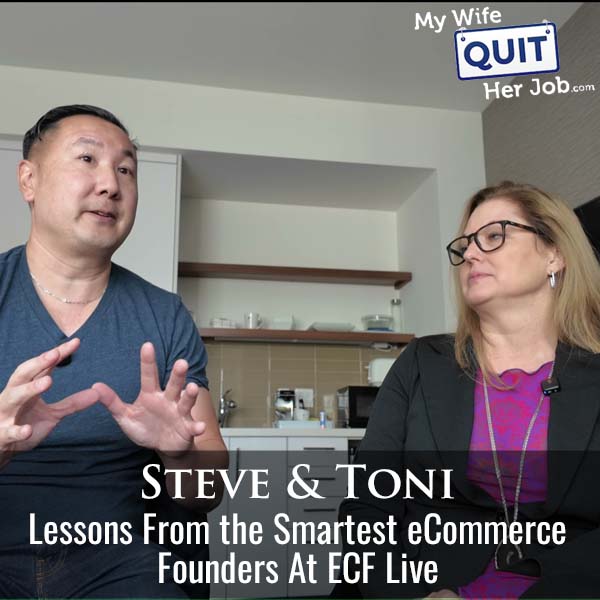612: Lessons From the Smartest eCommerce Founders At ECF Live

```html E-commerce Experts Share Automation Insights at ECF Live, Highlighting AI's Growing Role
Bozeman, MT – E-commerce experts Steve Chou and Toni Anderson, of the popular MyWifeQuitHerJob.com podcast, recently attended Ecommerce Fuel Live (ECF Live) in Bozeman, Montana, and shared key takeaways focusing on automation and AI’s increasing influence on online businesses. Their discussion highlighted actionable strategies for streamlining operations and improving efficiency, particularly for businesses selling physical products online.
Key Takeaways: Automation and AI-Driven Solutions
Chou and Anderson emphasized the importance of identifying and automating repetitive tasks to free up resources and improve overall efficiency. They specifically discussed using AI tools to personalize customer interactions and improve inventory forecasting.
Personalized Customer Outreach
Anderson highlighted the need for personalized communication with customers who make large purchases. "If someone comes in and spends $800, they are probably a group or a church or a co-op," she explained. "So we want to have a personal relationship with them." She outlined a strategy to automate notifications to customer service when an order exceeds a certain dollar amount, triggering a personalized outreach instead of generic marketing emails.
Chou shared an example of using AI to identify potential wedding or event planners based on order history and personalization details. He described a system that analyzes order data using ChatGPT to determine the probability of a customer being an event planner, allowing for targeted communication and relationship building.
Inventory Forecasting with AI
Both Chou and Anderson stressed the potential of AI for improving inventory forecasting, a common challenge for e-commerce businesses. Anderson noted that while many expensive SaaS solutions exist, AI tools can provide a cost-effective alternative. “A lot of those inventory forecasting SaaS software… are really expensive tools,” Anderson said. “So it’s like, then why don’t we just take the 10% and just get the information we need for free or for $20 a month, right?”
Expert Perspective: The Rise of AI in E-commerce
Dr. Emily Carter, a professor of e-commerce and digital marketing at the University of California, Berkeley, commented on the growing trend of AI adoption in e-commerce. “AI is no longer a futuristic concept; it’s a practical tool that businesses of all sizes can leverage to improve efficiency, personalize customer experiences, and gain a competitive edge,” Dr. Carter stated. “The key is to identify specific pain points and then explore how AI can address them, rather than trying to implement AI for the sake of it.”
Dr. Carter also cautioned against over-reliance on AI. "Human oversight is still crucial," she emphasized. "AI can provide valuable insights and automate tasks, but it's important to have human expertise to interpret the data and make informed decisions."
Tools and Resources: N8n and Make.com
Chou and Anderson recommended N8n and Make.com as platforms for connecting different software applications and automating workflows. N8n is a free, open-source platform that requires self-hosting, while Make.com offers a paid service with a user-friendly interface. Both platforms allow users to integrate Shopify with AI tools like ChatGPT and Claude, enabling custom automation solutions.
N8n: Free, open-source automation platform (requires self-hosting) Make.com: Paid automation platform with a user-friendly interface
Historical Context: The Evolution of E-commerce Automation
The evolution of e-commerce automation has been a gradual process, starting with simple order processing systems and evolving to complex AI-powered solutions. In the early days of e-commerce, businesses relied heavily on manual processes for tasks like inventory management and customer service. As technology advanced, businesses began to adopt more sophisticated software solutions to automate these tasks. The introduction of AI has further revolutionized e-commerce automation, enabling businesses to personalize customer experiences, optimize pricing strategies, and improve supply chain management.
Current Trends: Outsourcing and Global Talent
The podcast also touched on the trend of outsourcing development work to Latin America, where skilled developers can be hired at lower rates. Chou mentioned a contact who was paying $30,000-$40,000 per year for a Latin American developer and was very satisfied with the results. The discussion also noted the growing popularity of hiring employees in the Philippines.
Mark Thompson, a technology consultant specializing in e-commerce solutions, adds, "The shift towards global talent pools is accelerating. Companies are realizing that they can access highly skilled professionals from around the world without the overhead costs associated with hiring locally. This trend is particularly prevalent in software development and customer service roles."
Looking Ahead: The Future of E-commerce
The insights shared by Chou and Anderson at ECF Live underscore the growing importance of automation and AI in the e-commerce landscape. As technology continues to evolve, businesses that embrace these tools will be better positioned to thrive in an increasingly competitive market. The focus on personalized customer experiences, efficient inventory management, and strategic outsourcing will be crucial for success in the years to come. ```
Originally sourced from: WifeQuitHer Job
